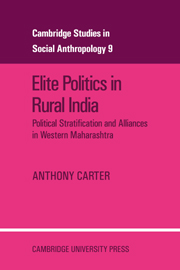 Elite Politics in Rural India
Elite Politics in Rural India from Part 3 - Political alliances
Published online by Cambridge University Press: 02 March 2010
THE INSTABILITY OF HORIZONTAL POLITICAL ALLIANCES
As I suggested in Chapter 1 and as much of the material presented in the previous chapter demonstrates, one of the most striking features of horizontal political alliances in Western Maharashtra is their instability. This might appear to make the task of analysis extremely difficult, but, in fact, if the instability of horizontal alliances is placed against the other features of the political system it provides a key for the isolation of the crucial factors in political action.
Coalitions in the Shriram Co-operative Sugar Factory
An examination of coalitions formed on the Board of Directors of the Shriram Co-operative Sugar Factory since its founding in 1957 provides further confirmation for the view that horizontal alliances are unstable. The first Board of Directors of the Sugar Factory was appointed by the Bombay Government. Vijaysingh M. Naik Nimbalkar was Chairman and M. G. Date was Vice-Chairman. Other non-official members were M. B. Bedke (Maratha, Phaltan), K. K. Borawake (Mali, Phaltan), D. G. Pawar (v∂t∂ndar Maratha, Asu), R. M. Gawade (vatandar Dhangar, Gokhali), M. N. Doshi (Gujar, Gunavare and Phaltan), T. R. Shinde (v∂t∂ndar Maratha, Khunte-Shindevadi), S. R. Bhosle (v∂t∂ndar Maratha, Phaltan), Kondiram J. Ranavare (v∂t∂ndar Maratha, Jinti) and Sahebrao Bhosle (v∂t∂ndar Maratha, Hol).
The first Sugar Factory election was held in i960. The entire Board was up for election and the slate supported by the Rajasaheb was returned without a defeat. V. M. Naik Nimbalkar, M. G. Date, D. G. Pawar, Sahebrao Bhosle, and K. K. Borawake were re-elected by the producer members.
To save this book to your Kindle, first ensure [email protected] is added to your Approved Personal Document E-mail List under your Personal Document Settings on the Manage Your Content and Devices page of your Amazon account. Then enter the ‘name’ part of your Kindle email address below. Find out more about saving to your Kindle.
Note you can select to save to either the @free.kindle.com or @kindle.com variations. ‘@free.kindle.com’ emails are free but can only be saved to your device when it is connected to wi-fi. ‘@kindle.com’ emails can be delivered even when you are not connected to wi-fi, but note that service fees apply.
Find out more about the Kindle Personal Document Service.
To save content items to your account, please confirm that you agree to abide by our usage policies. If this is the first time you use this feature, you will be asked to authorise Cambridge Core to connect with your account. Find out more about saving content to Dropbox.
To save content items to your account, please confirm that you agree to abide by our usage policies. If this is the first time you use this feature, you will be asked to authorise Cambridge Core to connect with your account. Find out more about saving content to Google Drive.